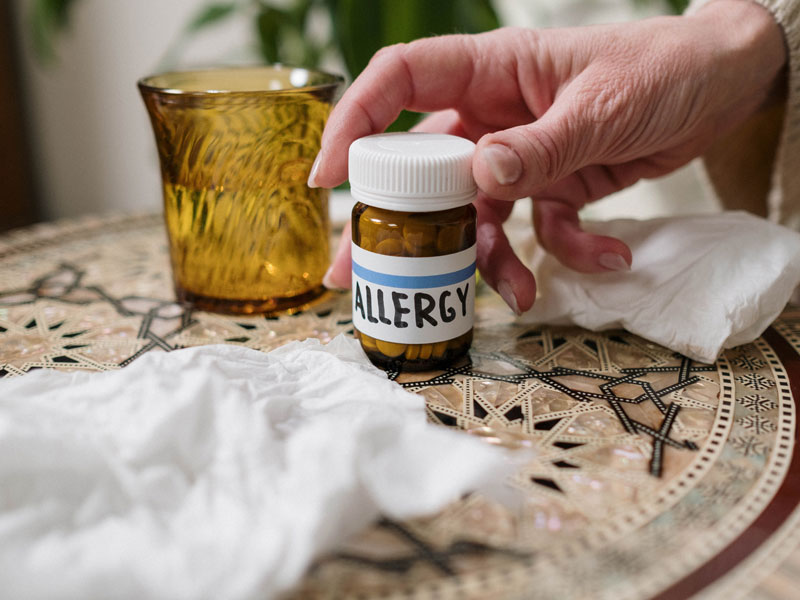
I am deathly allergic to cats and dogs but have lived with it because, well, I would rather have allergies than live without my pets. My allergies come in two forms: allergic rhinitis and asthma. For the purpose of this article, I’m going to focus on allergic rhinitis and will write a separate blog about asthma.
I took an allergy test a few years ago and found out that I was also allergic to certain types of grass, mold and dust but I was most allergic to cats and dogs. I use to take Zyrtec everyday until my mid-30s when I started noticing my joints were becoming inflamed and painful. It wasn’t just my joints, Zyrtec isn’t meant to be taken long term. So my body was going through some crazy motions… the most debilitating side effect for me, personally, was the way it dried up all my mucus membranes. Thats what Zyrtec does, it stops allergies by drying up mucus membranes but the problem with this is that your entire body needs that lubrication — from your joints to your other organs, they all need mucus and when you take Zyrtec religiously like I had to, that function just messes up everything in your body. So all joints started hurting, my knees hurt, i couldn’t walk or run long distances anymore because my joints would be hurting. Can you imagine being in this kind of pain and I wasn’t even 40. Another major side effect for me was the brain fog. Zyrtec kills off the good bacteria in your gut microbiome. Your gut microbiome is your second brain. (Ref. Harvard Medical School, “The enteric nervous system that regulates our gut is often called the body’s “second brain.”)
So I turned to alternative anti-histamines and found these wonderful natural alternatives:
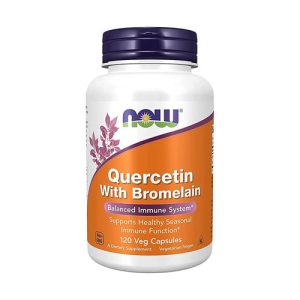 1. Quercetin with Bromelain — is an anti-inflammatory. Quercetin is from the dark skin of fruits, dark plant pigments called flavonoids), of fruits like blueberries, onions, grapes, etc. It is an anti-oxidant. Bromelain is added to the quercetin so that our bodies are able to absorb it better. Bromelain is a digestive enzyme made from pineapples. Below are studies that show how effective quercetin and bromelain are for allergies and allergic rhinitis.
1. Quercetin with Bromelain — is an anti-inflammatory. Quercetin is from the dark skin of fruits, dark plant pigments called flavonoids), of fruits like blueberries, onions, grapes, etc. It is an anti-oxidant. Bromelain is added to the quercetin so that our bodies are able to absorb it better. Bromelain is a digestive enzyme made from pineapples. Below are studies that show how effective quercetin and bromelain are for allergies and allergic rhinitis.
This is the Quercetin with Bromelain product that I use: https://amzn.to/3XJWWde
https://www.ncbi.nlm.nih.gov/pmc/articles/PMC7227109/
Excerpts (Conclusion) from study: (on the efficacy of quercetin and bromelain on allergies)
In the current article, we reviewed the effect of quercetin on allergic asthma, AR, and AD. Allergic diseases are a big concern and have high health care costs. In addition, the use of current therapies such as ß2-agonists and corticosteroids has been limited for long term use due to their numerous side effects. Quercetin, which has a long story of usage in human history, has been demonstrated sufficient efficacy and has no significant side effects. It has the potential to reduce the most significant pathologies of asthma such as eosinophil and neutrophil recruitment, the activation of bronchial epithelial cells, collagen and mucus production and airway hyperactivity. It also can suppress the production of both periostin and periostin-induced eosinophil chemoattractants and resulting in the improvement of the clinical condition of AR. In fact, it will be a good candidate as a supplement for the management and treatment of allergic diseases, especially rhinitis. Since medicinal plants have a low price, natural origin, and fewer side effects, quercetin seems to be a good therapeutic nominee for allergic diseases in clinical trials.
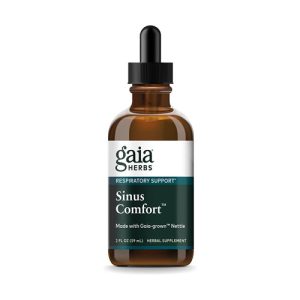 2. Sinus Comfort, Gaia Herbs — is made of an all organic blend of stinging nettle leaf, yarrow aerial parts, plantain leaf, bayberry root, holy basil leaf, thyme leaf, peppermint leaf essential oil — this combination is in liquid form and you use a dropper to measure 60 drops. To take the supplement you add 60 drops of the supplement in a little bit of water and drink — it relieves allergic rhinitis within 10 to 20 minutes for me. I use this supplement sometimes when the quercetin isn’t strong enough and my system is super inflamed. There are many studies that pertain to these ingredients, i wont go through all of the ingredients but only mention the main plant ingredients.
2. Sinus Comfort, Gaia Herbs — is made of an all organic blend of stinging nettle leaf, yarrow aerial parts, plantain leaf, bayberry root, holy basil leaf, thyme leaf, peppermint leaf essential oil — this combination is in liquid form and you use a dropper to measure 60 drops. To take the supplement you add 60 drops of the supplement in a little bit of water and drink — it relieves allergic rhinitis within 10 to 20 minutes for me. I use this supplement sometimes when the quercetin isn’t strong enough and my system is super inflamed. There are many studies that pertain to these ingredients, i wont go through all of the ingredients but only mention the main plant ingredients.
Below is a study for stinging nettles:
https://www.ncbi.nlm.nih.gov/pmc/articles/PMC5963652/
Excerpts (and Conclusion) from Study: (on the efficacy of stinging nettles root on allergic rhinitis)
Current study shows certain positive effects of Nettle in the management of allergic rhinitis on controlling the symptoms based on the SNOT-22 and also similar effects was demonstrated by placebo. Hence, the exact efficacy of Urtica dioica in this respect could not be determined in this study. We believe that our limitations underscore the need for larger, longer term studies of different pharmaceutical dosage forms of Nettle for the treatment of allergic rhinitis.
Below is a study for yarrow: (links to a .PDF)
https://ruor.uottawa.ca/handle/10393/38516
Excerpts from Study: (on the efficacy of yarrow on allergies/ inflammation)
The respiratory pharmacology of yarrow was examined by testing the immunomodulatory effects of four plant parts in an in vitro assay using BEAS-2B human bronchial epithelial cells. Concentrations of the pro-inflammatory cytokines IL-6 and IL-8 were quantified using ELISA kits. Flowers demonstrated significant anti-inflammatory activity at 40 μg/ml in both assays, and also at 20 μg/ml in the IL-8 assay, suggesting a dose-dependent response. Roots displayed significant pro-inflammatory activity at all concentrations. A second mechanism of action via the endocannabinoid system was tested through inhibitory enzyme assays for fatty acid amide hydrolase (FAAH) and monoacylglycerol lipase (MAGL), in which the flowers and roots were most active. Since extracts of the four plant parts exhibited significantly different bioactivities, active metabolites previously identified in yarrow were quantified in each part through the targeted profiling of phenolics and alkylamides using analytical chromatographic techniques. Phenolic compounds were found at highest concentrations in the flowerheads, while alkylamides were detected predominantly within roots. An accompanying phenological analysis of alkylamide and phenolic levels in all parts was explored. Collectively, this research provides the first integrated comparison of yarrow ethnobotany, bioactivity, and phytochemistry across different parts of the plant, contributing novel insights into the traditional, contemporary, and future uses of one of North America’s most important medicinal plants.
 3. ASEA Redox— Its important to remember that the supplements above only address the symptoms and do not in fact provide a cure. Curing allergies meant, for me, not having my pets around and that was simply unacceptable for me — I cannot live without my pets. Adding ASEA Redox to my arsenal of supplements made living with my pets possible. I now have them ( my dog and cat) in my bedroom although they still are not allowed on the bed. Im not able to find any meta studies on the efficacy of Redox on Allergies because its a “young” supplement. In my personal experience, I was unable to function properly with pets inside the house because I would have a runny nose and my breathing would be shallow — now, I am able to function well and can even work in my home. I don’t have allergies or allergic rhinitis like I use to. I don’t take quercetin or sinus comfort daily, if at all. I have them for back up, also when I clean the cat litter box!
3. ASEA Redox— Its important to remember that the supplements above only address the symptoms and do not in fact provide a cure. Curing allergies meant, for me, not having my pets around and that was simply unacceptable for me — I cannot live without my pets. Adding ASEA Redox to my arsenal of supplements made living with my pets possible. I now have them ( my dog and cat) in my bedroom although they still are not allowed on the bed. Im not able to find any meta studies on the efficacy of Redox on Allergies because its a “young” supplement. In my personal experience, I was unable to function properly with pets inside the house because I would have a runny nose and my breathing would be shallow — now, I am able to function well and can even work in my home. I don’t have allergies or allergic rhinitis like I use to. I don’t take quercetin or sinus comfort daily, if at all. I have them for back up, also when I clean the cat litter box!
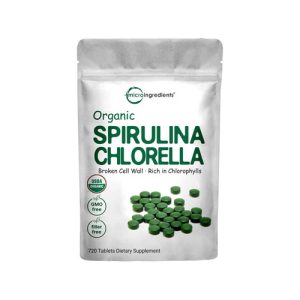 4. Spirulina — Like ASEA, Spirulina can assist in strengthening your immune system. Remember allergies are an immune response so you have to help make your immune system stronger. Thats where Spirulina comes in. Spirulina is rich in nutrients and is most commonly known as blue-green algae. It contains nutrients such as thiamin, riboflavin, niacin, copper, iron — also rich in omega’s 6 and 3 — all nutrients that your body needs in order to heal itself. Below are studies that support Spirulina’s efficacy in dealing with allergies:
4. Spirulina — Like ASEA, Spirulina can assist in strengthening your immune system. Remember allergies are an immune response so you have to help make your immune system stronger. Thats where Spirulina comes in. Spirulina is rich in nutrients and is most commonly known as blue-green algae. It contains nutrients such as thiamin, riboflavin, niacin, copper, iron — also rich in omega’s 6 and 3 — all nutrients that your body needs in order to heal itself. Below are studies that support Spirulina’s efficacy in dealing with allergies:
https://www.ncbi.nlm.nih.gov/pmc/articles/PMC7416373/
Excerpts from the Study:
Given the increasing prevalence of AR [Allergic Rhinitis], it is necessary for ear, nose and throat (ENT) specialists, as well as other physicians involved in treating this condition, to manage CAM therapies used by patients 5. Spirulina as one of the drugs used in CAM treatment of AR that is a type of blue-green algae that belongs to cyanobacteria and grown on a large scale. Few studies have investigated the effect of spirulina on control and management of AR. The use of spirulina has been widely commercialised as a nutritional supplement to balance the function of the immune system and as treatment for a range of diseases 6. Today, spirulina is predominantly utilised as a nutritional supplement in the pharmaceutical industry in the form of pills or powder. The effect of spirulina on inflammatory mediators in human samples has been limited to the results of one study up to now 7. To the best of our knowledge, no study has simultaneously examined the clinical and laboratory effects of spirulina. The aim of the present study was to determine the therapeutic effect of spirulina platensis on AR.
Conclusion of the Study:
The use of spirulina seems to be more effective than the administration of cetirizine in improvement of both clinical presentations and inflammatory mediators of AR [Allergic Rhinitis] patients. Spirulina should be considered as an alternative treatment in patients with AR.
This is the Spirulina brand that I personally use: https://amzn.to/3wJXCmF
The study concluded that Spirulina is more effective than Cetirine HCL, a synthetic OTC drug that is marketed to treat allergic rhinitis. Despite studies like the above and many others, no one is marketing Spirulina as an effective allergic rhinitis supplement, which is unfortunate.
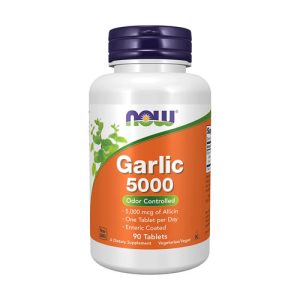 5. Garlic (Allicin) — One of the ways that you can help your body fight allergies is by strengthening your immune system. Garlic, scientific name Allicin, is a superior daily supplement for immune health. There are many meta studies citing garlic as more than a supplement for allergies but we are going to focus on Garlic as a daily supplement for allergies and asthma, here is the meta analysis:
5. Garlic (Allicin) — One of the ways that you can help your body fight allergies is by strengthening your immune system. Garlic, scientific name Allicin, is a superior daily supplement for immune health. There are many meta studies citing garlic as more than a supplement for allergies but we are going to focus on Garlic as a daily supplement for allergies and asthma, here is the meta analysis:
https://www.ncbi.nlm.nih.gov/pmc/articles/PMC6801723/
Conclusion of the Study:
Using a Der p–engendered allergic asthma model in mice, we estimated the anti-inflammatory effects of different fractions of garlic extracts (HE, DI, EA, BU, and WA). The WA fraction had a clear protective effect against allergic asthma. Specifically, treatment with the WA fraction significantly decreased airway inflammation and reduced expression of IL-13, -4, and -5 in BALF as well as serum IgE and IgG1. Therefore, the WA fraction could regulate the imbalance between Th1 and Th2 by inhibiting Th2 cytokines and inflammatory protein. Histological results reveal that the WA fraction attenuated Der p–induced inflammatory cell infiltration in lung tissue and cell infiltration within the submucosal layer of the trachea. The WA fraction also expressed anti- inflammatory activity by inhibiting IL-6/PI3K/Akt/NF-κB signal pathways. In conclusion, the WA fraction was effective in treating Th2-type allergic responses in asthma engendered by Der p in a murine model, indicating that it might be a protective agent for use in patients with allergic asthma.
This is the garlic brand that I personally use: https://amzn.to/3wT39Yu
If you have allergies, allergic rhinitis, in particular and have more questions for me, let me know via my contact form.

